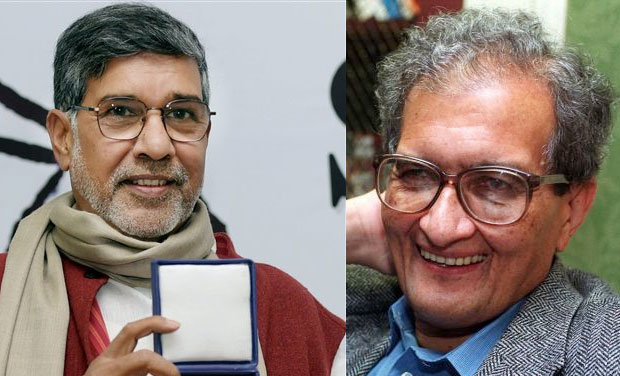United Nations: Indian Nobel laureates Amartya Sen and Kailash Satyarthi and economist Kaushik Basu are among the over 225 global leaders who have jointly called for a meeting of the G20 nations to agree to a USD 2.5 trillion coronavirus global health and economic recovery plan.
The letter signed by over 225 past and current leaders from around the world, calls for the G20 Summit to be convened urgently to address the health and economic crises in the wake of the COVID-19 pandemic and to put forth a global recovery plan.
The G20 countries had on March 26 pledged USD 5 trillion to counter the impact of the pandemic amid forecasts of a deep recession.
The pandemic has killed over 375,000 people worldwide, ravaged the global economy and left millions jobless.
Sen, Satyarthi and Basu are signatories to the letter along with other leaders from every continent, including former UK prime ministers Gordon Brown and Tony Blair, former UN secretary general Ban Ki-moon, former president of the UN General Assembly María Fernanda Espinosa, former president of Sri Lanka Chandrika Kumaratunga and Director-General of the National Council of Applied Economic Research, New Delhi, Suman Bery,
The leaders said that while the G20 is not due to meet until late November this year in Saudi Arabia’s capital of Riyadh, action is urgent because only a fraction of the USD 2.5 trillion that poorer countries need to fight COVID-19 has been allocated.
“Time is running out to avert a further global health and economic disaster as 440 million more people face poverty and 265 million face malnutrition.
“Without action from the G20, the recession caused by the pandemic will only deepen, hurting all economies and the world’s most marginalised and poorest peoples and nations the most. Representing, as it does, 85 per cent of the world’s nominal GDP, the G20 has the capacity to lead the mobilisation of resources on the scale required. We urge leaders to do so immediately,” the letter said.
The signatories said that the time is right for the G20 leaders to hold a second meeting to discuss measures to advance the implementation of the G20 Action Plan, and agree to a more strongly coordinated global response to the health, economic and social emergencies the world faces.
“Our world is at a critical moment. Therefore, we write again to underline the urgency of delivering immediate relief to countries facing the effects of an unprecedented, global crisis. For the first time (in) this century, global poverty is on the rise. The problems faced by the poorest countries in Africa, Asia and Latin America demand immediate action, as do those confronting diverse middle-income economies,” the letter said.
“May 30 saw the highest daily figure recorded worldwide for new cases of COVID-19. On every continent, countries are attempting to stop the transmission of the virus,” the letter said.
Noting that G20 has demonstrated that it can bring people together around a common set of actions, the signatories said, “what it decides next on the COVID-19 response will have a direct bearing on the future of the world economy.”
Pointing to the increase in world poverty, former Prime Minister of New Zealand Helen Clark noted that the IMF has said that emerging markets and developing countries need USD 2.5 trillion to overcome the crisis but only a fraction of that amount has so far been allocated. She said concrete measures must urgently be agreed and be implemented in full.
Former UK prime minister Brown, who chaired the G20 summit in 2009, said that without a G20 leaders’ meeting online soon and certainly long before the end of November, “a vacuum in global leadership will open up just at the time when we need global action most – to avoid a second wave of COVID coming out of the poorest countries and to move the world economy from rescue operations to planning a global recovery.”
The leaders said in the letter that there is need for global coordination of the development, mass manufacturing and equitable distribution of a vaccine or vaccines to ensure that they are universally and freely available as quickly as possible.
“We urge every G20 member to support in full the June 4 USD 7.4 billion replenishment of Gavi – the Vaccine Alliance – which between 2021-2025 will immunise 300 million children, saving up to 8 million lives. While we fight COVID-19, we must not allow the resurgence of other infectious diseases,” it said.
They added that on the economic front, debt relief for the 76 International Development Association countries needs to be scaled up radically to include relief by bilateral, multilateral and private creditors until the end of 2021, and operationalised with urgency.
Further, the G20 should agree that the USD 2.5 trillion level of support will now be provided and this requires the IMF, the World Bank and regional development banks to raise their lending and grant ceilings.
“COVID-19 is a wake-up call to the global community. The global health and financial architecture must be further strengthened, and in parts redesigned, to enhance our preparedness and capacity to act with speed and at scale to fight future crises,” the leaders said in the letter.
PTI






































